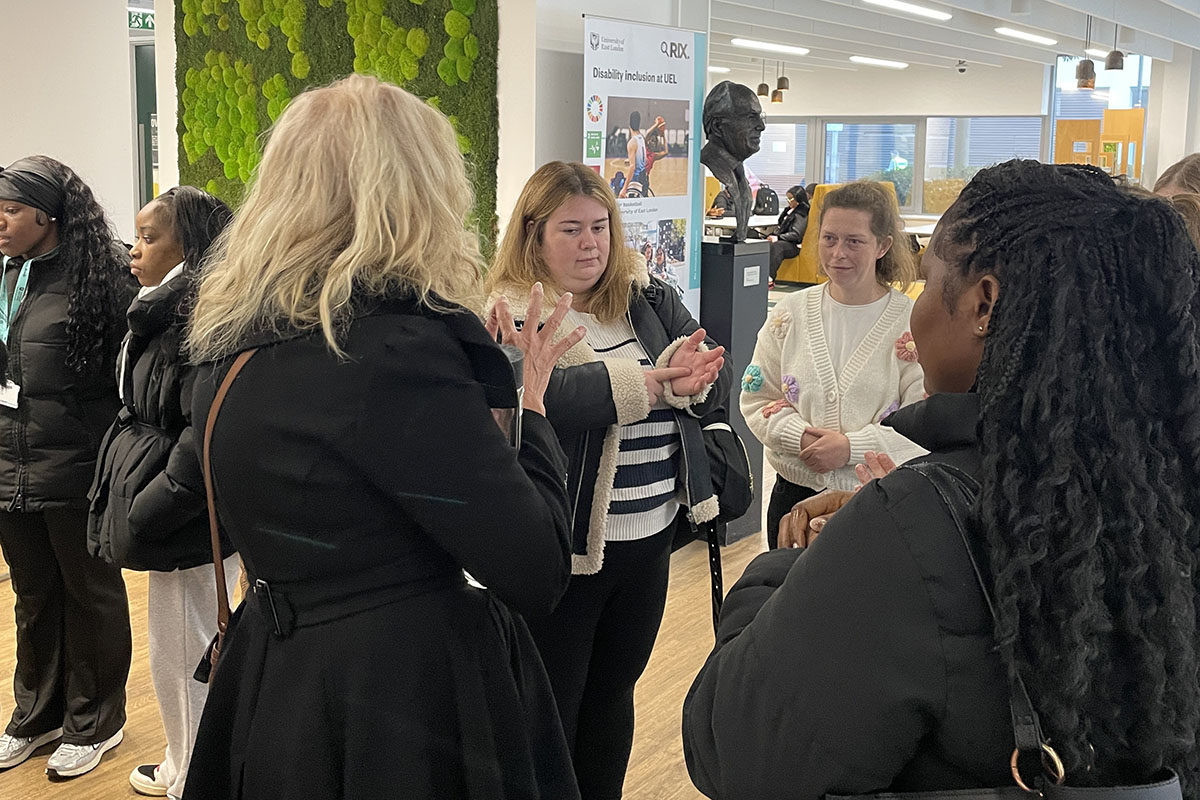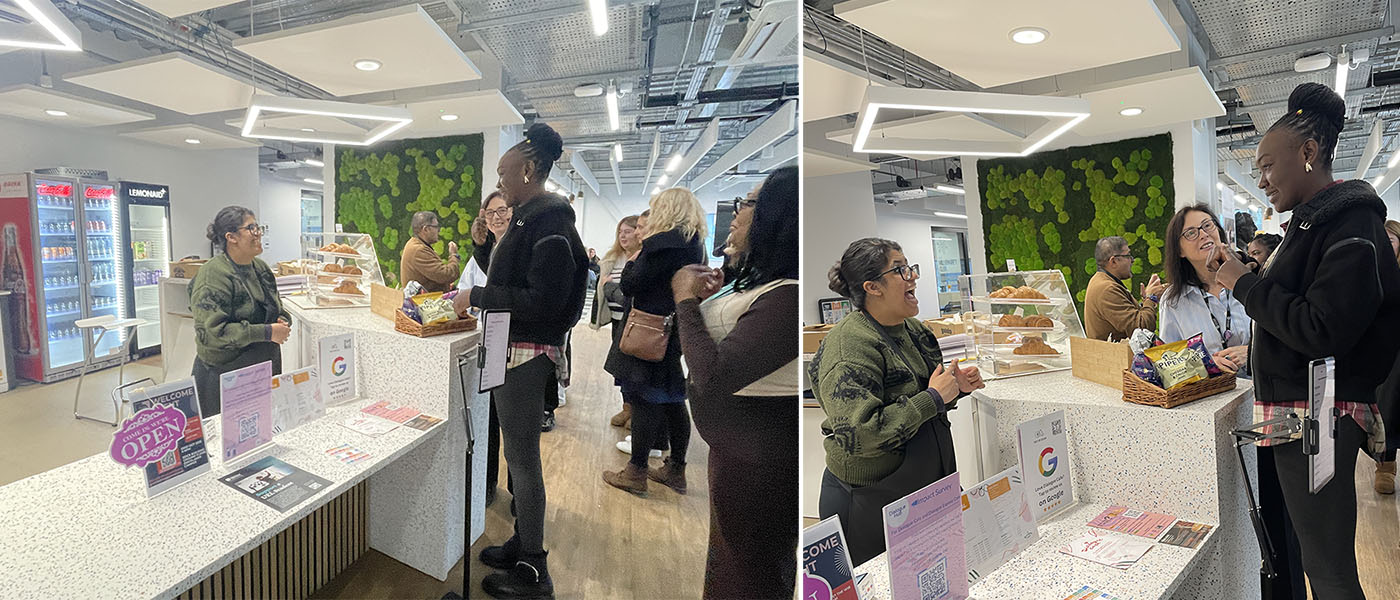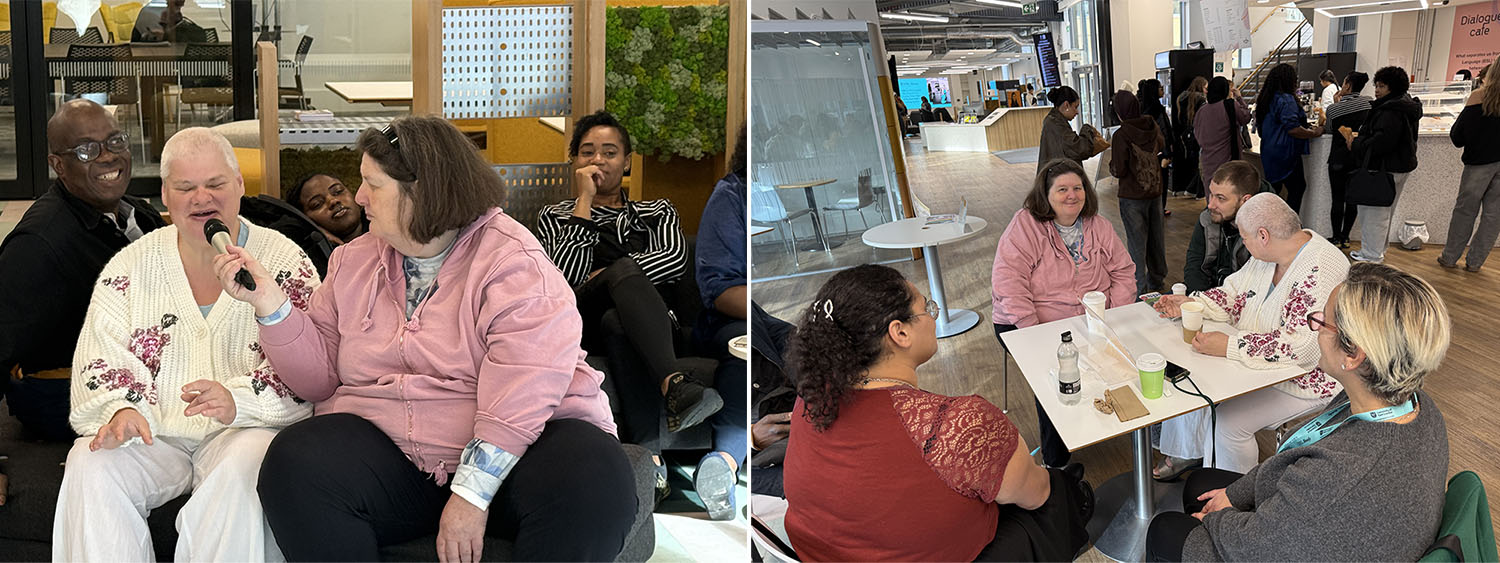Сегодня, как и каждый год, мы собрались на ежегодное "Коммуникационное кафе", организованное Инклюзивным исследовательским институтом Рикса в партнерстве с коллегами по социальной работе и Кафе "Диалог, Социальное предприятие, управляемое членами сообщества глухих.
Это мероприятие стало одним из самых дорогих моментов в нашем учебном расписании, предлагая нашим студентам, занимающимся социальной работой, возможность испытать инклюзивную коммуникацию в действии, вне аудитории и в ярком, гостеприимном общественном пространстве.
Когда студенты прибыли на занятия, в воздухе витало спокойное чувство предвкушения и легкой тревоги. Многие не знали, чего ожидать от этой встречи, от утреннего обучения не по учебникам или лекциям, а через связь, любопытство и беседу.
Мы радушно встретили их и начали со знакомства с британским языком жестов (BSL) и Макатоном, задав тон дню, в котором общение будет принимать различные творческие формы.

Студенты научились простым, но действенным навыкам - как представиться, поприветствовать кого-то, заказать напиток или пирожное на языке жестов. Смех, несколько нервных хихиканий и огромное чувство удовлетворения, когда руки уверенно двигались по новым знакам. “Это так практично, я действительно могу это использовать!” - сказал один из студентов, радуясь тому, что осваивает реальный навык, преодолевающий языковые барьеры.

Вскоре после этого прибыли наши гости с опытом обучения с ограниченными возможностями. Их тепло встретили и помогли заказать угощения у стойки кафе "Диалог", используя знаки и жесты. Этот небольшой акт имел огромное значение, поскольку воплощал в себе принципы достоинства, автономии и инклюзии, лежащие в основе практики социальной работы. С напитками в руках все заняли свои места за столами, готовые говорить, делиться и слушать.
Вскоре завязалась беседа. Первоначальная нервозность улетучилась, когда люди заговорили о своих симпатиях и антипатиях, о любимых отпусках и незабываемых впечатлениях. Атмосфера была дружелюбной, полной смеха и искренней связи, которую невозможно передать словами. Многие студенты впервые встретились с людьми с ограниченными возможностями, и было очевидно, что эта встреча мягко, но сильно изменила их представления.
В первой половине дня наши гости начали использовать инструментарий RIX Multimedia, чтобы поделиться своими Обо мне информация. С помощью фотографий, видеороликов и коротких клипов они показали моменты из своей жизни - вечеринки по случаю дня рождения, игры в боулинг, отдых на море и повседневные дела, которые демонстрируют независимость и возможности. Несколько жителей с гордостью поделились видеороликами, на которых они сами готовят еду, объяснив, что теперь в их доме все готовят по очереди. “Теперь мы сами готовим себе ужин”, - сказали они, широко улыбаясь. Гордость и радость в эти моменты были заразительны.

Посмотрев эти презентации, студенты увидели, как цифровые инструменты, такие как RIX Wikis, дают людям с нарушениями обучаемости возможность высказаться о том, кто они такие и что для них важно.
Это уже не было абстрактным ‘вовлечением пользователей услуг’, это был живой пример расширения прав и возможностей, самостоятельности и самозащиты в действии.
Когда наши гости ушли, кафе стало местом для размышлений. Мы собрали студентов, чтобы обсудить их опыт и то, что они вынесли для себя. Многие говорили о том, насколько утро отличалось от их ожиданий. Некоторые признались, что до прихода в кафе чувствовали себя неуверенно и даже боязливо. “Я не знал, что говорить и как себя вести”, - признался один из студентов. “Но как только мы начали общаться, я поняла, что они такие же люди, как и все остальные, забавные, добрые и интересные”.”
Другие размышляли о более глубоких уроках этого дня, о языке инклюзии и о том, как наши слова формируют восприятие. Они обсудили разницу между медицинской моделью инвалидности, благотворительной моделью, которая фокусируется на недостатках и потребностях, и социальной моделью с ее подходом, основанным на силе, которая признает, что барьеры создаются обществом, а не отдельными людьми, и отмечает навыки и способности людей. Вместе они обсудили, как будущие социальные работники будут бороться с этими барьерами и выступать за равное участие и уважение.
Для многих из них это была первая реальная встреча с людьми с ограниченными возможностями. К концу утра их первоначальное беспокойство сменилось любопытством, сочувствием и уважением. Они говорили о том, что видят способности там, где раньше представляли себе ограничения, и понимают общение не как фиксированный навык, а как общий человеческий акт, который может принимать форму речи, жеста, знака, изображения или присутствия.
Когда мы завершали сессию, у нас было четкое ощущение, что этот опыт оставил глубокое впечатление. Он дал больше знаний, понимания и личностного роста, чем может дать любая лекция. Один из студентов так подытожил это: “Сегодняшний день показал мне, что социальная работа - это не значит знать все, а значит быть открытым, слушать и встречать людей там, где они есть”.”
Наше Communication Café - это не просто мероприятие, это праздник разнообразия, творчества и связи. Оно напоминает нам о том, что общение - это не только слова, но и понимание, уважение и общая человечность. Оно знаменует начало пути наших студентов как рефлексирующих, сострадательных практиков и напоминает, что, в конце концов, все мы люди, и всем нам иногда нужна небольшая помощь.
Жители и их семьи очень рады, что им предоставили такую возможность, ведь слова ‘Я учусь в университете’ поднимают самооценку и дают ощущение значимости, которое они не всегда признают в себе. Какие потрясающие достижения! Спасибо вам и вашей замечательной команде за то, что сделали это возможным для всех наших жителей, мы вам очень благодарны". (Жаки Бейли, Airthrie Homes)
